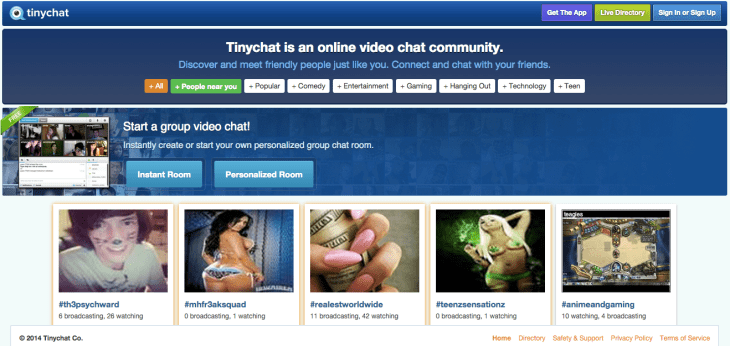Mega-popular messaging apps like WeChat or WhatsApp today typically boast over half a billion (or even one billion) users, and now we are seeing some consolidation among some of the (slightly) smaller players, specifically on the video messaging front. Video chat service Tinychat has been acquired by Paltalk, another video messaging company that operates a service under its own name as well as another called Camfrog (also picked up by way of acquisition). Paltalk says Tinychat will remain a standalone application. Together, the three will have 225 million registered users.
As part of the deal, Tinychat co-founder Michael Stern will join Paltalk as VP of product development. The startup’s other co-founders Martin Redmond and Daniel Saltman are going to pursue other projects.
“Paltalk has been known as an innovative leader in video chat for more than 15 years,” said Stern in a statement. “We look forward to working with their team and drawing on their deep expertise and resources to exponentially grow the Tinychat audience.”
Terms of the deal are not being disclosed, Eric Sackowitz, COO of Paltalk, told me via email. Tinychat, founded in 2009 before messaging apps really took off, had a cadre of celebrities among its investors, with Ashton Kutcher, Sean Combs (P. Diddy that is), Troy Carter Guy Oseary, Ron Burkle and Naval Ravikant all chipping in to a $1.5 million round in 2011.
Paltalk, which is profitable, has raised $6 million from Softbank, a very modest amount in the current climate of messaging apps raising hundreds of millions in funding.
While video chat once felt like something cutting edge and the next frontier for communications — ironically, we once covered both Paltalk and Tinychat in the context of rumors we’d heard that Skype was looking to buy one of them or their competitors to add in more video features — these days video is as common as any other communication medium.
Sackowitz says that Paltalk and Tinychat are not like the rest, however. Unlike every group video chat app in the market, Paltalk is primarily a social network that helps people meet and chat with one another around shared interests by powering self-organized virtual groups, he says. “It’s not limited only to conversations with friends and family – although that functionality is offered and there are members that use it for that purpose.”
Paltalk and Tinychat both host a long-tail of groups that include support groups for cancer survivors, distance learning, DJ playlists and karaoke groups. “There’s a discovery and entertainment aspect that pure messaging apps can’t match.”
At the same time, video has become a very hot commodity among tech companies looking to build out premium advertising and more engaged audiences, with consumers turning to these more and more as broadband networks and video quality improve.
Paltak was interested in Tinychat for a couple of reasons, Sackowitz says. Part of it had to do with users.
“We think Tinychat put together a great community and are very aligned with our thinking about how group video chat can provide people with ways to meet, socialize and develop long-lasting relationships around various interests,” he says, noting also that scaling trend that’s necessary for running essentially free or incremental payment-based services at a profit. “We believe there are certain economies of scale that are necessary for this kind of technology to both grow and also be profitable, which we’ve proven out with Paltalk over the past decade.”
While Tinychat will remain a separate platform for now, there are also possibilities of integrating down the road. “At this point, we plan to continue to operate Tinychat as a standalone app, just as we do Camfrog, but it’s possible that we may integrate it into Paltalk in the future,” he says.
Paltalk’s active members average over 22 hours per month and 53 million minutes per day online.
Paltalk itself works on a freemium model, and Sackowitz says subscriptions and virtual gifts/stickers drive the majority of revenue.
Tinychat complements that: it also has a freemium model but compared to Paltalk makes a higher proportion of sales from advertising. “We expect to build out their subscription model and add virtual gifts/stickers in the future,” he says.
The company is not disclosing any actual revenue figures (boo) but notes that Paltalk has been profitable for more than a decade. Not so for Tinychat. “Tinychat is still really in growth mode but is already close to being profitable,” he notes.
